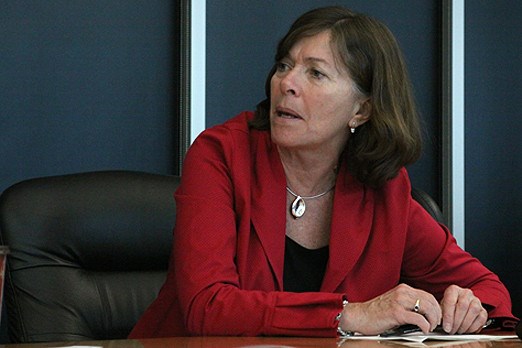The government’s out of sight out of mind mentality only further damages its relationship with First Nation communities and halts any changes from happening, says the NDP Aboriginal affairs critic.
MP Bruce Hyer (NDP, Thunder Bay – Superior North) along with Lakehead University’s Aboriginal Management Council invited MP Jean Crowder (NDP, Nanaimo-Cowichan) to join in a roundtable discussion on Aboriginal issues. The meeting was held at the Lakehead University Advanced Technology and Academic Centre on Saturday.
Crowder, also the NDP Aboriginal affairs critic, spoke to a roundtable filled with guests from various First Nation organizations AND communities in the region.
She said she wanted to understand what the issues were in Northwestern Ontario but suspected that the discussion would move towards three main topics: housing, education and drinkable water.
"Reserve schools are funded far less than the provincial rates." Crowder said. "You end up with schools that can’t pay their teachers. The completion age for kids in high school is way less than the provincial average. We know if kids don’t finish school, they’re not going to get good paying jobs and you can’t get yourself out of poverty unless you have a good paying job."
Most houses on First Nation communities are mouldy, overcrowded and don’t have indoor plumbing, she added.
Indian and Northern Affairs Canada continues to have the mindset that they know best for the First Nation people and if the relationship is to change then both parties need to respect each other and allow input on decisions, she said.
If the relationship isn’t mended then problems in other areas won’t improve, she added.
"Part of the problem is this mind set of out of sight out of mind," she said. "A lot of these communities are remote, people don’t get out to them and they don’t understand what the issues are. The fundamental relationship has to change."
Nancy Bouchard, chair of the Aboriginal Management Council, said they partnered with Hyer so that Crowder could learn more about issues in the region and bring those concerns back to Ottawa.
One example she gave was the recent funding cut to the Anishinabek employment and training summer program. The program used to receive $75,000 annual to sponsor summer students. The funding helped students find job opportunities in Thunder Bay or in their home communities.
The jobs helped to enhance the students’ education but without the funding those opportunities are gone, she said.
"There are issues and concerns from the local area about post-secondary education," Bouchard said. "We use to be able to fund both post-secondary and secondary students to work in their own communities or on placement here in Thunder Bay but now they have taken that away."
Hyer said it was important to ensure that First Nation communities continued to receive proper support from the government.
"When I look at the future of Thunder Bay and Northwestern Ontario, it’s going to be very closely tied to the tremendous potential that lies within our Aboriginal people," Hyer said. "If Aboriginal people don’t do well then none of us are going to do well."
Hyer said he wanted to keep the roundtable to a small size but would be open to the idea of a large open forum with Crowder as a key speaker.
Sign in or register
- Messages
- Post a Listing
- Your Listings
- Your Profile
- Your Subscriptions
- Your Likes
- Your Business
- Support Local News
- Payment History
Registered Users
Already have an account?
New Users
Create a free account.
